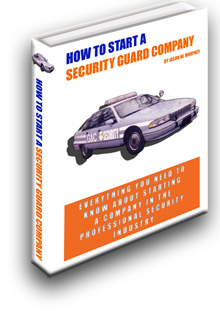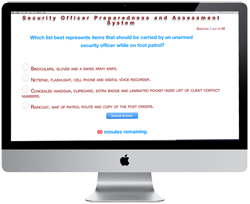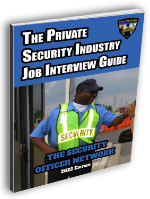 Practice Test
Training
Regulations
Security FAQs
Member Support
Sign In
Join
Practice Test
Training
Regulations
Security FAQs
Member Support
Sign In
Join

LAST EDIT March 8, 2023
Question: Should I apply for law enforcement?
Listen to Content From This Article.
Full disclosure: as the Administrator for The Security Officer Network I obviously have a bias. This notwithstanding, just a few years ago, had you asked me for my very best career advice, I would have more likely than not encouraged you to use private security work as a first step to becoming a police officer or some other iteration of law enforcement.
As the owner of my own security agency I never tried to deter my officers from applying for police jobs. I recognized their desire to serve and was happy that they saw my agency as a starting point into the wider world of actual law enforcement.
At that time private security work really couldn't compare to the prestige of law enforcement. I knew better than to hold my officers back. But, these days, things are changing; and, if you, as a new security officer, ask for my advice on this matter, then here's what I would share.
This isn't an all inclusive list and your circumstances will vary but these are items you need to carefully consider before putting in your law enforcement application.
So let's get the obvious out of the way first.
There's still no question that as a police officer you will make more money. At least in the early days of your career.
This has always been the clear reason to become law enforcement instead of staying security; and, still to this day you should expect that a starting pay check for PD is going to be at least 50% higher than the new security officer's salary—with better benefits.
However, there's one big problem: it's your debt load. Yup, it's that college degree that costs way too much but you had to have in order to qualify for the law enforcement job. This debt will haunt you for years into the future.
Then, there's comp and overtime. Government agencies get away with treating their employees in ways the private sector can't. In some government agencies when you are stuck late doing traffic control at an accident scene or pushing papers at the end of the shift and can't get off on time, you are earning "comp" time. Comp time is time that you can take off in the future in lieu of overtime pay.
This only works for so long because after a while you build up more comp time than practical and this can just become pointless. As a security officer, at least in the early days before you become salaried, you may find that many agencies will happily assign you to as much overtime as you would like to work. This means you will work more hours, but the work is a fraction of the mental health toll that the police officer experiences—more on this in a minute.
The overtime pay is money you can save up for starting your own security entrepreneurial endeavors.
As a security officer you have almost immediate upward salary mobility because you can quickly train and go armed and once assigned to an armed site you will probably experience an immediate 20% to 25% increase.
All of the above notwithstanding, at least in the first few years, you will probably make more money working PD; but all of this is in the context of your initial salary. In a minute we will look at the bigger picture, the big vision, of what your overall net worth might look like in the long term if you remain in the security industry.
Without doubt police work entails more risk to your safety than does security. It's a simple numbers game. On any given shift PD repeatedly goes to the action; as security, much of the time, the action must come to you. You are signing up for a much higher stakes game when you apply to become a police officer; and, this is actually a draw to some of the more adrenaline-minded officers.
But, it's important to note that the liabilities of police action aren't over once the arrest is made or the ticket is written. A bad encounter earns the police officer a lifetime enemy. People don't forget their interactions with the police—even when those people were completely in the wrong. This greatly handicaps an officer's ability to live a normal life in his community.
Juxtapose this with the security officer who rarely if ever has to issue citations and even when he does they don't have the impact of law. He only occasionally makes an arrest and doesn't make new, lifelong enemies each day at work. When a security officer does have to take action to end a situation, he's less likely to be blamed by the offending party and the public as a whole because the situation came to him; he didn't go to the situation.
This is hardly fair to the police officer but it is our society's current state of reality; and, that's a reality that has evolved over the past decade, is continuing to evolve and thus part of the reason for why my personal view on this matter has also changed in the last few years.
One more point: Those security officers who are adverse to risk can request posts where they are unlikely to experience physical confrontation. A risk-adverse police officer probably doesn't have that same luxury. He has to answer the call for help no matter the circumstance.
Politics ruins everything.
You probably know where this is going. It's a clear reason for why you should stay in private security and away from employment with the police.
Depending on the culture of your community some of the law enforcement politics are obvious: how you do your job; who you can arrest; which intoxicated person gets criminally charged, which just gets off with a trip to the drunk tank and which is the recipient of a courtesy ride home; who you can write a ticket to and who the district attorney will actually prosecute and who will they give a free or an almost-free pass. All of these political considerations can make your actual job—an impartial enforcer of the same law on everyone—to be a near-impossible challenge to carry out.
But, there's more to politics than just these obvious examples. And they can have a big impact on your career.
Here's one example of how political decisions made far away in city hall can be super damaging to the would-be police professional.
The City Manager lobbies the City Council for money for new police positions. The Council awards the funding. As soon as the budget is approved the Police Chief opens the positions and starts taking applications.
However, the City Manager isn't great with money management and to make matters worse he has been playing politics with his department heads. He's very close to the Public Works Director and overcommitted himself by authorizing big pay raises to her department heads.
This creates a cash shortage. The City Manager needs to right the ship by clawing back some of the police department's money. He calls in a favor with the Chief. Let me move around some money over to public works and then I will owe you one. He tells the Chief to go slow on the hiring and do whatever he can to keep the police department positions open until the end of the fiscal year when they will roll over the new positions into the next year and fund them with appropriations from the next budget.
"Don't worry, you will still get your new employees. Just buy me a few months' time."
But, remember, the Chief has already opened up hiring for the police positions.
What will he do?
Easy, he instructs his officers to get really picky with the background check requirements on the current crop of applicants. He nitpicks everything he can in order to disqualify the applicants. "Oops, we couldn't find anyone qualified for the position. It's a tight labor market you know. We probably aren't paying enough. Oh well! We will just re-post the positions in a few months."
Problem solved!
Well, not really. Because the problem has been transferred to the finalists for the open position who took all of the time to make it to the background check stage of the hiring process and then were flunked out by a bogus hit on their background; a bogus hit that would have never happened in a normal hiring process.
As they apply for future law enforcement positions these finalists may be required to disclose the fact that they were previously rejected in the background check stage of an application at another government entity.
These applicants are now less marketable.
Why would a hiring agency want to spend their time and resources moving an applicant's application at their department? They and even the applicant probably don't know that the real reason for their rejection was simply due to the financial mismanagement of the politicians at the original place of application.
This is a completely immoral and reprehensible type of politics that has a real-world impact of harm on public servants.
It's just one example of the harm enacted on real-live human beings by cold, uncaring, unfeeling politicians and make no mistake: everyone in charge of your law enforcement department, including your chief, is a politician. Politics and politicians are the worst!
Juxtapose this with the private security industry where when things get political, in a worse case scenario, there's always someone else looking to hire. As a security officer your career has near-complete portability. No one cares if you have a bad experience at one or more of your previous companies. Present yourself well, give a good interview—see The Security Officer Network's most recent interview guide.
Also, speaking of politics, there's no end of politicians who will use the police to accomplish their political means. They expect the police to enforce their absurd, overreaching, even unconstitutional laws. This leaves the officer at the whims of an ever-more unwise, feckless political class that has grown up in the social media era and which often isn't capable of long-term strategy or understanding second order effects. Upon experiencing the inevitable blow-back, if they can get away with it, they will most certainly leave the officer holding the blame.
In terms of making a real, meaningful difference in their community, police officers have historically been much better positioned than their security officer counterparts.
This altruistic motivation to improve lives has exemplified the best of America's public servants: an honest desire to help those in their greatest time of need and to have a long-term impact for good in the community.
But times are changing.
In the past an officer might intervene in a bad situation and use this intervention to become acquainted with and to subsequently stay in contact with the parties involved. He would know of their challenges and could mentor and guide those people involved—especially troubled youth—into a better life.
Now, society is very different and much more complicated than it used to be. Online connectivity is destroying the concept of geography-based communities. For example, in the past, a school resource officer might be able to influence at-risk juveniles for the better. Now those juveniles are spending much time exposed to the corrupting influences of an online world that's far beyond the purview of that officer and thus his ability to actually mentor is greatly limited.
This is not to mention the many new legalities necessitated due to the fallout of having an ever-more complicated and corrupt society. These legalities handicaps a mentor, and, now, an ever-growing lack of respect for law enforcement makes his ability to build relationships in the first place even more difficult.
In short, in many communities, it's becoming so much more difficult for a law enforcement professional to have a real life-changing impact.
To be sure, as a law enforcement officer you will still get the rush of taking the drunk driver off the streets, stopping a crime in progress, providing life saving medical care such as CPR, etc. But, making a real difference, by mentoring and changing lives over the long term will likely become ever more and more difficult.
Here's a reason why you should remain a security officer: security industry jobs have amazing portability. Keep your debt low, put yourself in a position to live on a modest budget and you will always be just fine in the security industry. That's because it's easy to get security jobs. You don't have to worry about a supervisor who doesn't like you, a bad client, or a post you don't like. When these misfortunes happen you can simply pick up and go and find a better agency with better circumstances. You can lose one job in the morning and be working a post for a different company by the evening.
In contrast law enforcement jobs are harder to lose but they are also harder to get. This can keep an officer locked in with a job he hates. That's never fun and it destroys morale and makes for a toxic work culture known as the golden cage, i.e., a bunch of co-workers who hate their job but are trapped into the same organization and its toxic culture because of the nice salary and benefits.
So every department has its own circumstance but this is for sure a major reason for why one would stay in the security industry: mental health.
In many large departments you can expect that PD has lost containment and its officers have been put into a stressful position that no human should be exposed to for a prolonged period of time: desperately trying to keep up with priority assistance calls while being treated to a first-hand view of societal decay and the consequences of a society that's lost it's moral compass. It takes a very strong person to compartmentalize this negativity and to keep it from destroying his mental health.
Then, if you are in one of those ever-growing number of departments that have been politicized and have lost the ability to be proactive, your self-protection instincts are going to kick in and you will be tempted to stand by and only get involved when absolutely required. This also is bad for your mental health. It's induced laziness and a bit of fiddling as Rome burns. This compromises your professionalisms and is bad on your morale, work-ethic and overall outlook on life.
In some jurisdictions you will have to deal with the fact that the criminal that you arrest will be back on the streets and possibly googling your home address–before the end of your shift; a sad fact that's not conducive to your mental health.
Security also experiences some mental health stressors; but, many of them are minor and easily overcome by the based individual. He's going to need to get used to being called a rent-a-cop, an insult that's impact on mental health is easily mitigated by simply not acting like a rent-a-cop.
There are the unfair and unreasonable clients and supervisors and the ever-constant pressure of being called in to cover the shifts of those who didn't show up for post; a pressure that becomes more frequent once the officer becomes a supervisor and has responsibility for a post. Security agencies can take the officer for granted and that's not good. But it's not a big deal, nor does it take a toll on the mental health of most. In a worst case scenario the officer can simply go to work for a different agency.
As a rule, employment as a law enforcement officer probably looks better on a resume. But, a security officer who obtains supervisor status can also sport an acceptable resume that's conducive to accomplishing many of his long-term goals. Additionally, his resume is less likely to experience the discrimination of those who view law enforcement negatively. And, it's actually potentially more malleable, i.e., a security-industry resume can easily take on an IT security stance while a law enforcement resume is potentially more rigidly defined by the high-profile nature of the police's officer's work and the public perception of the job.
The law enforcement officer will make many contacts throughout his career. These will serve him well in the future. From legal community personalities such as prosecutors and judges, to specialists in the law enforcement community, to everyday officers. These contacts will prove to hold value in the police officer's future endeavors such as private security entrepreneurship during his post-law enforcement career. His officer acquaintances and former coworkers will become prime candidates for his future security agency's talent pool.
However a security officer will have a specific, inside view of the actual security industry. He will discover the identities of clients, the personalities that make up the various security agencies in the city and the locations of security sites. All of this will benefit him as he works towards his future as a security professional such as security consultant or security agency owner.
Here's one of the strongest cautions I can give against going into law enforcement. So many people in society are giving in to the temptation to indulge in behavior-modifying substances. Those who are under this influence stop thinking strategically and in their own best interest. This means they stop operating according to a logical, predictable course of action. Even worse, they all-to-often become impervious to less-than-lethal compliance options. This puts officers into an array of ever increasingly bad positions and it's getting worse and worse. With each additional encounter, the officer increases his chance of either having his career brought to an end because he did not act quickly enough or making a career ending mistake that many in the public will not understand—nor can they—because they don't live the life of the officer and many don't realize just how bad it is becoming out there.
So, now, upon reviewing the pros and cons, let's develop your long term vision. If, after all of my warnings, your vision is to still serve a community as a law enforcement officer, perhaps advancing in rank to supervisory or investigate services and retiring with a strong retirement plan at which point you will have the option of starting your next career as a security professional, then fine! Let's do it.
Here are some tips.
Take your time and choose your community carefully.
Avoid the large departments in the big cities where the police have lost containment and are chasing calls and the public sector has likely been politicized beyond any hope of redemption. This is a complete non-starter! These cities are replete with politicized prosecutors and judges who are rigid ideologues and have put their ideology far ahead of the impartial rule of law. These departments exist in an atmosphere of soul-breaking corruption and that's not good for anyone.
Likewise, it's also probably best to avoid small towns. These towns probably won't pay much more than your security salary and they are easily subject to the political whims of the latest muckety-muck who has been elected to city council. There's very little insulation between the small town city council and the few handful of town police officers who have to be very careful in order to survive in the small town environment.
The law enforcement sweet spot still lies with those mid-sized communities that are big enough to provide a layer of protection between the politicians and the police department and where the department hasn't lost containment and started chasing calls.
One caveat: Do not go to work in any town, no matter the size, if it shares a judicial district with a large city. Politicized, big-city, prosecutor ideologues won't hesitate to ruin the career of a suburban police officer if it helps them win their next election.
Essentially, look for a mid-sized community that lies outside of the big judicial districts and where proactive policing is still ongoing.
Once you find your community, don't move there. Instead take up residence at a neighboring community where you and your family can lead a normal life in your off hours. This way, when attending your kid's soccer game, you're less likely to find yourself sitting next to the guy who you ticketed the day before.
Also, do whatever you can to avoid student loan debt—or any debt for that matter—but especially student loan debt. This is the debt that will keep you trapped in a job that you don't enjoy.
As a bonus tip, use extreme caution before going to work for federal agencies. These agencies are quickly toxifying as a by-product of the deterioration of civility in the nation's politic. Certain parties have their favorite agencies and their hated agencies as federal law enforcement continues becoming more-and-more pawned by the dysfunctional federal government.
Likewise, it's usually best to avoid most Sheriff's departments. Sheriff's department politics are some of the nastiest politics I've ever seen. Because of the political nature of the job one group can win an election for a term only to be replaced by a rival faction four years later. Then, the displaced group spends time trying to get back at the new group and this toxification distracts from actual law enforcement. Worse, since these are law enforcement officers, who are accustomed to using the law to prosecute people, they can easily weaponize the law against their opposition and you could be on the receiving end of political prosecution.
These are oftentimes low paid positions. Really, the only reason to apply for a deputy position is to get a police certification in order to become eligible to work at the bigger departments. If you go this route, get your certification and try to move on quickly before the next election cycle.
Finally, I don't discourage applying for many of the state agency law enforcement positions. These positions are decent-paying and frequently protected from overt political influence. State law enforcement officers often seem to operate in a much more relaxed environment and in many states they provide an example of non-partisan, sane law enforcement in an otherwise increasingly insane world.
Perhaps you have heeded my warnings and want to explore a career as a professional security officer without first going into law enforcement.
Here's what I have to say to you: good choice! But whatever you do, avoid the trap of working security without a vision. It's a real hamster wheel and there are too many officers working at low-to-mid paying posts without a plan for becoming a true security professional.
I believe it's possible to make more money in security than you could ever make in law enforcement. It's just a matter of putting in your dues for a few years, maybe as little as two or three before branching out on your own and building your own security world.
I'll write more about this in a moment; but for now, my advice to you is just, maintain your long-term outlook and never stop working towards your vision.
Let's assume that it's your long-term vision to earn independent wealth through the ownership of your own security personal, technology or consulting firm. In the not-too-distant future you want to be positioned to work when you want to, work where you want to, and have a valuable asset—your own security company.
Which path is best for you? Law enforcement or security?
Let's take a hypothetical look at these two career paths. Officer One chooses the law enforcement path and Officer Two stays exclusively with private security.
Officer One follows the advice in this article and goes to work for a mid-sized community of 120,000 people. He starts on a salary of $55,000 and over the next 25 years advances in rank to the position of Shift Lieutenant making $120,000 annually.
After 25 years he takes an early retirement, has no debt, and has savings that he can invest into starting his own company; but, problematically he wasn't allowed to start a security agency until his retirement. Though he has a stable retirement income, he's 25 years late to the game of building his own security asset.
Officer Two starts out as an unarmed security officer for a large corporate security firm. He is paid $17.50 per hour. In his first year he seeks out overtime pay opportunities. Then he gets his armed certification and a pay bump to $22.50. By the end of the year he has earned a post supervisor position. He will work that position for two years. It's just enough time to save up a few thousands dollars and to meet his state's requirement of supervisor experience. This allows him to apply for a security agency license. His savings help him to fund his business license, insurance and some basic startup costs. He then goes to work soliciting for an onsite security client and upon winning his first client he quits his corporate job and bootstraps his agency by personally working the first client's site.
Officer Two works hard, keeps soliciting for clients and after three or four years finally reaches the stage where his business generates enough profit that he can choose when to work and which posts to work—after all it is his company; a valuable asset that he has built and that he couldn't have created had he been hired on at PD.
While Officer One remains a relatively low-level police drone Officer Two has already won his freedom and can use his business to explore the exciting areas of security policy such as celebrity personal protection or high-end corporate consulting and pentesting. Really the options are unlimited.
You can read much more about this security bootstrap business plan in the book How to Start a Security Agency.
Which of these career paths seems best to you?
Though it may seem counter intuitive, if you are willing to hustle clients, the security industry by far offers the greatest upside. Law enforcement may pay more at first but in the end it can become a golden cage that inhibits the officer's independence and is a slower burn to financial independence and flexibility.
I hope you have found this advice to be helpful.
If a career as a security professional is interesting to you, then consider joining us at SecurityOfficerNetwork.com. It's the professional security officer's status symbol of choice.
Your Invitation to Join Us: Are you a security professional? Have you joined The Security Officer Network? Your Security Officer Network membership is the professional security officer’s status symbol of choice and your Network Transcript is sure to impress your security employer and/or clients. If you have not yet joined us, join today at securityofficernetwork.com/join/secpdf.
Are you ready to start thinking about starting your own security company? Check out this 140 page ebook from The Security Officer Network entitled "How to Start A Security Guard Company". Get your PDF copy while it is still free! Or, order the paperback from Amazon.
How Much Can a New Security Agency Charge? - The new security agency's pricing strategy. Click to Read
What are the Components of the Security Guard Company Business Plan - The necessary elements of the Security Guard Company's business plan. Click to Read
How to Lower the Cost of the Securty Guard Company's Insurance Premiums - Methods for cutting the cost of insurance and undercutting the price model of the big security companies. Click to Read
How Much Should a Company Charge for Security Patrol? - Methods for charging for patrol route services. Click to Read

SecurityOfficerHQ.com is the exclusive provider of this free 57 page PDF guide. It features just about everything you need to know before taking the exam and includes The Professional Security Officer eCourse. You may get your copy for free right now only at SecurityOfficerHQ.com! Submit your name and email to receive your copy via email or click here to learn more about this guide.

SecurityOfficerHQ.com is the exclusive provider of this free 140 page PDF ebook. Less-comprehensive versions sell for $24, but, for the time being, you may get your copy for free right now only at SecurityOfficerHQ.com! Submit your name and email to receive your copy via email or click here to learn more about the book.

The forty question, free practice exam will test your unarmed security knowledge. It's the perfect test prep for those who must sit an exam before getting licensing.

This free job interview guide is the security officer's must-have resource. Get yours here.
© 2012 - 2026 The Security Officer Network
A Product of the 1918 Media Limited Liability Company
Addr: Thirty North Gould Street 2288
Sheridan, Wyoming 82801
Phone: (307) 461-6079
Red Hirundo Rustica Custom CMS and Testing Engine
Disclosures | Privacy | 307.461.6079